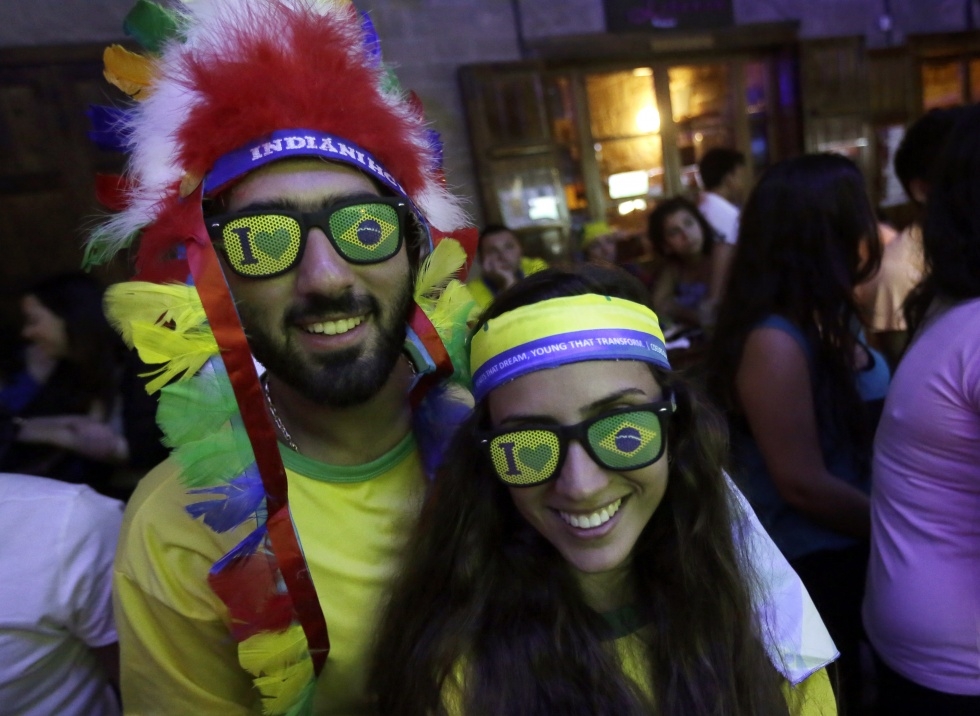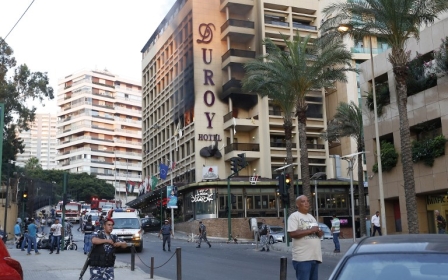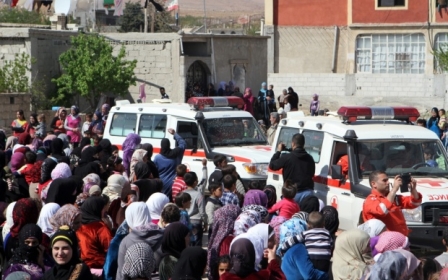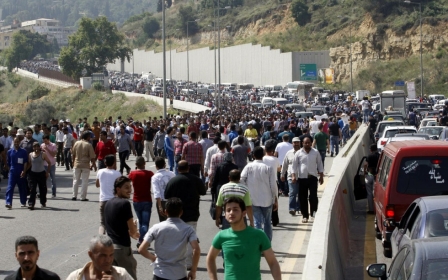Lebanon's World Cup own goal

When Brazil beat Croatia in the opening game of the World Cup on 12 June, Lebanon erupted in fanfare. Although it was the middle of the night in the diminutive Middle Eastern nation, fireworks were wantonly set off while cars and motorbikes draped in Brazilian flags made endless circuits accompanied by a cacophony of horns.
Among residents of Lebanon immune to World Cup fervour, the sudden commotion prompted a variety of creative interpretations. One friend of mine woke up convinced that Palestine had been liberated from Israel, while another assumed that his neighbourhood was under mortar attack. A friend’s uncle speculated that Syrian President Bashar al-Assad had been killed. Others thought Lebanon had finally managed to elect its own president after weeks without one.
A recent AFP article on the World Cup frenzy contends that the Lebanese “display a near-fanatical enthusiasm for chosen proxy nations” - fitting vocabulary, perhaps, given Lebanon’s history as a preferred site for international proxy battles. Citing a common Lebanese perception of “World Cup mania as one of the few non-political events in a country often marked by political and sectarian divisions”, the article ends with a quote from a 24-year-old Germany fan who describes the football competition as “a unifying event”.
Should this month-long “unification” be seen as an unquestionably positive arrangement?
Displacing compassion
Of course, there are mundane factors fuelling “near-fanatical enthusiasm”- like traditional Lebanese migratory patterns, thanks to which there are more persons of Lebanese descent in Brazil than there are in Lebanon itself.
But what does it say about the country when many Lebanese demonstrate greater compassion for foreign football teams than for their fellow citizens? (This is not to imply, obviously, that other countries are oases of human harmony and World Cup moderation but simply to focus on the implications of the lack thereof in Lebanon.)
To pick an example off the top of my head, more than one Lebanese Maronite Catholic has sworn to me that the “real Lebanon” extends only from an upscale Christian area of Beirut to the Christian town of Batroun north of the capital. This sort of exclusivist cartography leaves much of the country unaccounted for, including the areas periodically devastated by Israel.
Given the intense prejudices harboured by the self-appointed cartographers toward the excised population, it’s not an exaggeration to say that football teams are often likely to elicit more sympathy than the victims of Zionist aggression.
Add to this the respective prejudices of Lebanon’s 17 other recognised sects - all fuelled by politicians intent on fortifying the sectarian divide in order to maintain their own slices of power at the expense of the majority of the country’s inhabitants - and one wonders once again how it is that such an incoherent entity has ended up with a national flag.
The flag, which often appears flanked by additional flag-borne political propaganda belonging to one or more of the parties, has now also been joined on Lebanese buildings, homes, and vehicles by the flags of an array of World Cup contenders.
Incidentally, the idea that football can serve as a sort of antidote to Lebanon’s strife was superficially entertained in 2010, when, as the BBC reported, “[r]ival political leaders… marked the 35th anniversary of the outbreak of the civil war with a football match to show their unity”.
The spectacle took place to the amusement of some Lebanese and the chagrin of others. While “[s]ome of the [news] commentators had to stop themselves from laughing at the sight of their pot-bellied leaders running after the ball”, many people criticised the hypocrisy of political cooperation in frivolous sporting activities but not in any capacity that would resolve rather than sustain the challenges to daily existence in Lebanon.
As if to underscore the entrenched division between the Lebanese political elite and the country’s citizenry, the article notes: “Like all football matches in Lebanon, [the match] was not open to the public”.
Football as opium?
In a 2010 piece for The Guardian, British literary scholar Terry Eagleton argued that “[i]f every right wing think tank came up with a scheme to distract the populace from political injustice and compensate them for lives of hard labour, the solution in each case would be the same: football”.
Let’s face it: it’s a lot more fun to watch a football game than to ponder one’s own plight, much less the plight of other people. But the sense of solidarity that football culture provides encourages the neglect of other forms of solidarity that might help challenge oppressive political and economic systems.
In a critical response to Eagleton’s piece, political sportswriter Dave Zirin denounces as “elitist hogwash” the notion that sports lovers “are like babies suckling at the teat of constant distraction”, contending instead that “[w]e love [sport] because it's exciting, interesting and at its best, rises to the level of art”.
Zirin does, however, fully acknowledge the flip side of the sports industry, and, in a recent interview with journalist Charlotte Silver, details the deleterious effects of mega-sporting events like the World Cup on their host nations, which are subjected to human “displacement, debt and the militarisation of public space”.
Silver summarises Zirin’s findings regarding Brazil’s experience after being awarded the 2014 World Cup and the 2016 Olympics, two enterprises that ultimately function in the service of neoliberal imperialism. As of May, Silver notes, “20,000 homes in Rio had been demolished to make room for parking lots, stadiums and other spaces in which most Brazilians would never be able to step foot, yet must pay for with their money and blood: These massive construction projects are estimated to cost the public nearly $15 billion and have led to the deaths of nine Brazilian workers”.
To be sure, the burden of recognising the human toll of the World Cup - which entails efforts to purge cities of unaesthetic elements like poor people - does not fall uniquely on Lebanon. But some Lebanese will be interested to know that they may have more in common with the exploited of Brazil than with its football stars; the Israeli security firm Elbit Systems, a contributor to military destruction in Lebanon, was awarded a contract by the Brazilian air force to assist in World Cup-related repression.
So, as Lebanon continues to conduct its raucous post-match festivities, is this simply proof that - as Eagleton claims - “for the most part football these days is the opium of the people, not to speak of their crack cocaine”?
The argument can indeed be made that World Cup mania distracts from injustices at home and abroad. But given that injustices at home currently include an apparent massive influx into Lebanon of aspiring martyrs - three suicide bombings just took place in less than a week - it’s difficult to argue that folks don’t deserve a bit of distraction.
- Belen Fernandez is the author of The Imperial Messenger: Thomas Friedman at Work, published by Verso. She is a contributing editor at Jacobin magazine.
The views expressed in this article belong to the author and do not necessarily reflect the editorial policy of Middle East Eye.
Photo Credit: Lebanese supporters of Brazil follow on a screen the football match between Brazil and Mexico in the FIFA World Cup 2014 (AFP)
New MEE newsletter: Jerusalem Dispatch
Sign up to get the latest insights and analysis on Israel-Palestine, alongside Turkey Unpacked and other MEE newsletters
Middle East Eye delivers independent and unrivalled coverage and analysis of the Middle East, North Africa and beyond. To learn more about republishing this content and the associated fees, please fill out this form. More about MEE can be found here.





